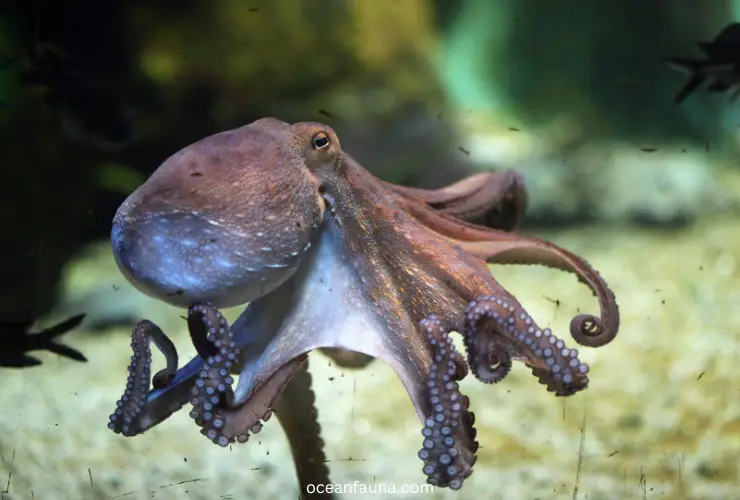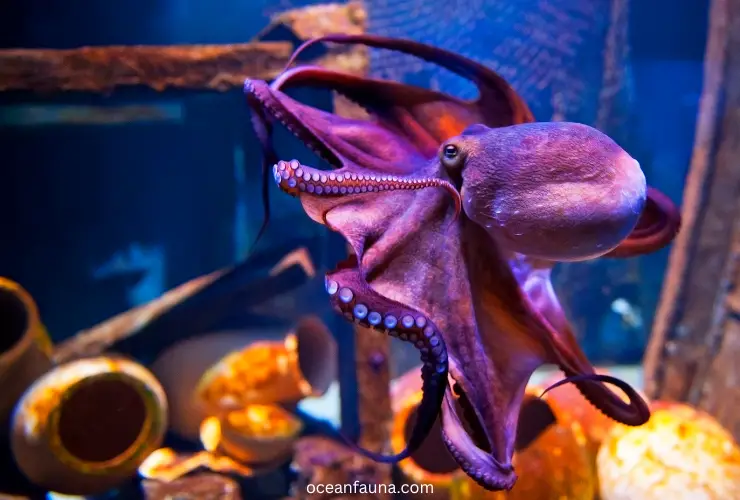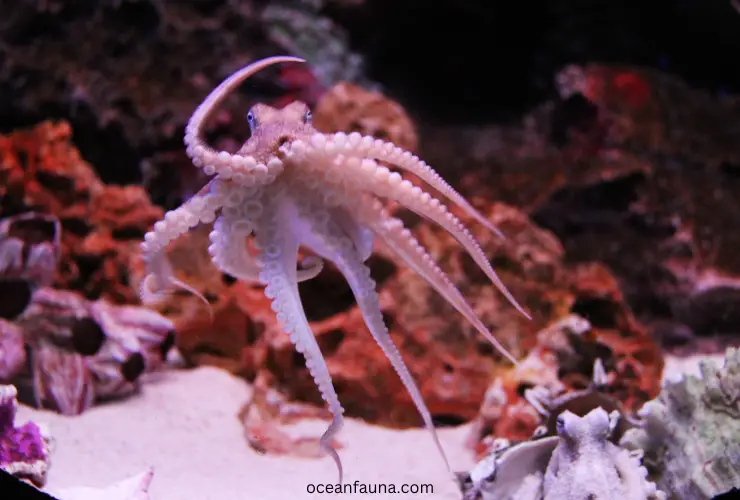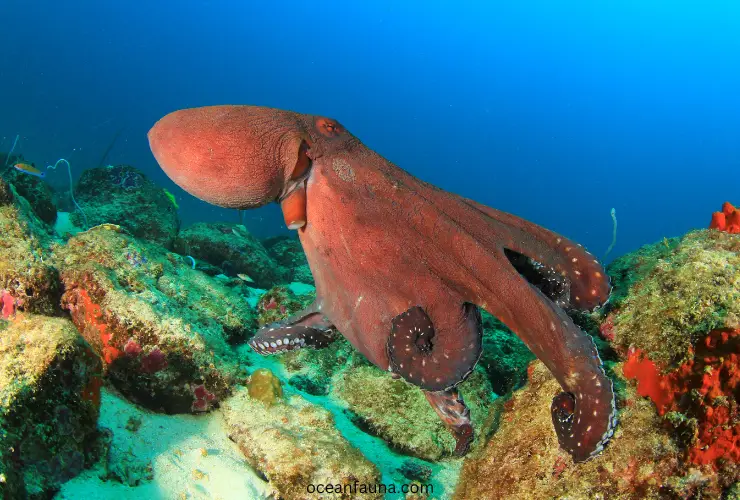Yes, octopuses can hear. However, regarding past reports, it was believed that octopuses might not hear any sound since they don’t have ears like other creatures. But now, it is proven that they can hear.
Now, the big question is, how do they hear? In this article, I will try to explain to you how octopuses can hear.
Can Octopus Hear?
Octopuses were once believed to be hairless, earless creatures that lacked the capability to hear. This understanding stemmed from the common misconception that hearing requires the presence of ears. However, it has since been discovered that they do, in fact, possess the ability to hear, albeit in a unique way.
While octopuses do not possess ears in the traditional sense, they have evolved a unique mechanism for detecting sound. They have two small sacs called statocysts located just behind their eyes.
These sacs are filled with fluid and contain tiny hair-like structures called cilia that move in response to sound waves. Nerve cells then detect this movement, which sends signals to the brain.
Research has shown that common octopuses can hear a range of frequencies between 400 and 1000 Hz, with their ideal range falling at 600 Hz. This range aligns with the sounds produced by other marine animals, such as crustaceans and fish.

Interestingly, octopuses have responded to sounds outside their optimal range at low and high frequencies, indicating they can perceive a larger spectrum than initially thought.
The ability of octopuses to hear has several implications for their behavior and survival in their marine environment. For example, they may use their hearing to locate prey, avoid predators, and communicate with other octopuses.
Additionally, the discovery of their hearing capabilities sheds new light on the complexity of their sensory systems and how they interact with their surroundings.
Do Octopuses Have Ears?
Octopuses do not have traditional ears like humans or most other animals. However, they are able to detect sound waves and vibrations in water through specialized structures located in different parts of their body.
For example, some species of octopuses have a unique group of fins that resemble floppy ears, known as Grimpoteuthis (Dumbo Octopus). These fins on both sides of their head allow them to swim in deep instead of detecting sound.
In addition to Grimpoteuthis, octopuses have other sensory structures that play a role in hearing. For example, their statocysts are fluid-filled sacs located near their brain that detect changes in orientation and movement in response to sound waves.
They also have specialized sensory cells, called cilia, that respond to vibrations and can detect even the faintest sounds.
While octopuses can detect sound waves, their hearing capabilities are limited compared to many other animals. They cannot detect high-frequency sounds, such as those produced by dolphins or bats, and rely mostly on their keen sense of sight and smell to navigate and locate prey.

How Does Octopus Hear?
Octopuses do not have ears like humans or other animals. Instead, they rely on specialized sensory structures located in different parts of their body to detect sound waves and vibrations.
Their statocysts are fluid-filled sacs located near their brain that detect changes in orientation and movement in response to sound waves. They also have specialized sensory cells, called cilia, that respond to vibrations and can detect even the faintest sounds.
The cilia detect sound waves and then send signals to the octopus’ brain. This enables the octopus to respond to sounds, such as prey movements or potential threats, in its environment.
How Strong Is the Octopus Hearing Capacity?
The octopus has a limited hearing capacity compared to many other sea creatures. While they can pick up on sound waves and vibrations, they do not have ears like humans or other animals. This means that their hearing is not particularly strong or precise.
Despite this limitation, octopuses are still able to detect a range of sounds underwater. The Common Octopus, for example, can hear sounds between 400 Hz and 1000 Hz. This means that they can pick up on sounds within a certain range of frequency.
Out of this range, their hearing ability is greatly reduced. It has been found that they hear the best at 600 Hz, meaning that sounds at this frequency are likely to be the most audible to them.
Overall, the octopus’s hearing capacity is not particularly strong compared to other marine animals. However, they are still able to detect sounds and vibrations in their environment, allowing them to navigate and communicate within their underwater world.
Why Don’t Octopuses Have Better Hearing?
Octopuses don’t possess any gas chamber within their body, which is critical for animals to amplify sound and increase their hearing ability. The absence of this vital feature is one of the primary reasons why octopuses cannot perceive sound.
Additionally, octopuses have a unique hearing mechanism in comparison to other animals. They utilize statocysts, which are specialized organs that sense sound through the movement of tiny calcium crystals.
However, the ability of statocysts to detect sound is limited as they only function at a narrow frequency range.
Furthermore, the propulsion system of octopuses also impacts their hearing ability. They move by contracting their muscles and expelling water from their body to move forward, creating a turbulent water flow around them.
This motion results in continuous vibration and noise, making it difficult for them to differentiate between sounds from their surroundings and their own movements.
Apart from these factors, the environment in which octopuses live also plays a crucial role in their hearing ability. Since water is a better conductor of sound than air, the sound waves in water can quickly disperse and lose strength. Consequently, it becomes challenging for octopuses to detect sound from a distant source.

Which Sound Can an Octopus Hear?
To determine what sounds an octopus can hear between 400-1000 Hz, understand their hearing abilities. Octopuses have a narrow hearing range and cannot detect frequencies below 400 Hz or above 1000 Hz.
Firstly, octopuses don’t have ears like humans do. Instead, they have a highly developed sensory system that allows them to perceive sound differently.
Octopuses have a pair of statocysts in their head that can detect sound waves and vibrations. These organs are filled with small calcium crystals that move when exposed to sound waves, sending signals to the octopus’ brain.
These statocysts enable the octopus to hear different sounds up to 1000 Hz, which includes other sea animals, such as fish and crabs. Additionally, the octopus can also detect the sound of its own movements underwater.
At higher frequencies, the octopus’s hearing capacity is greatly reduced, meaning that it won’t be able to pick up on audible sounds above 1000 Hz. This means that the octopus wouldn’t hear humans or other land mammals.
As for the specific range of 400-1000 Hz, octopuses are able to hear sounds within this range, but they may not be able to distinguish between different frequencies as well as humans can.
FAQs
Can an Octopus Make a Sound?
No, octopuses cannot make the sound in the traditional sense as they lack vocal cords. However, they do have the ability to produce sounds through their siphon muscle. The siphon is located on the side of the head and is used for jet propulsion, allowing the octopus to move through the water by expelling water through the siphon.
When an octopus needs to make a sound, it will contract its siphon muscle rapidly, causing water to be expelled through the siphon. This can create a popping sound that is audible to humans underwater. The sound is not a communication method for octopuses but rather a result of their movement.
Can an Octopus Hear a Human Voice?
No. Octopuses can hear sounds in a specific range between 400 Hz to 1000 Hz. However, the fundamental frequency of a typical adult male voice is between 85 to 155 Hz, and for a typical adult female voice is from 165 to 255 Hz. Therefore, octopuses cannot hear the human voice.
Are Octopuses Deaf?
Octopuses are not deaf, despite lacking ears. They have a sac-like structure called a statocyst, which contains a mineralized mass and sensitive hairs. This allows them to detect sounds of certain frequencies ranging between 400 to 1000 Hz. But, their hearing capacity is not as good as other ocean creatures.
Conclusion
Hopefully, now you have a compact knowledge of the hearing capacity of an octopus. Although they don’t have ears, they can still hear with the help of their statocysts.
If you have any further queries regarding the hearing power of octopuses, just let me know.

